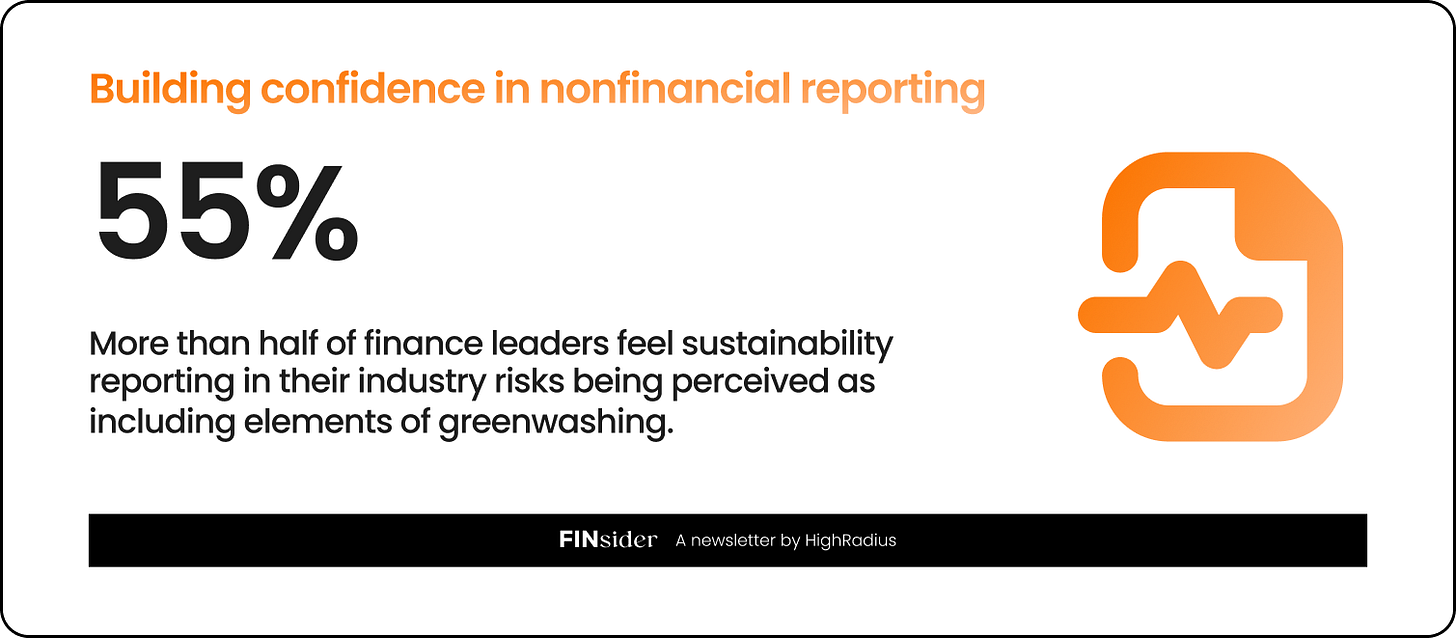CFOs today are battling an uphill fight against data quality, sustainability concerns, and AI adoption gaps. The 2024 EY Global Corporate Reporting Survey reveals hard-hitting numbers:
96% struggle with nonfinancial data quality
47% doubt their sustainability targets
55% fear greenwashing perceptions
32% lack AI-ready technology
What’s driving these challenges, and how can CFOs regain control? Let’s break it down.
47% CFO Doubt Sustainability Targets 🎯
Only 47% of CFOs believe their organizations will likely achieve stated sustainability goals.
Investors are only slightly more optimistic at 53%.
This stat reveals a stark gap between sustainability goals and execution. Without solid frameworks, ambitious targets go unmet. As CFOs scrutinize nonfinancial data, their skepticism exposes strategy and reporting flaws.
💡 Why this matters?
The lack of confidence is a credibility crisis. CFOs must shift from setting aspirational targets to building actionable roadmaps.
55% Fear Greenwashing ⚠
55% of finance leaders worry that their industry’s sustainability disclosures could be perceived as greenwashing. 74% of investors believe third-party assurance could restore confidence.
Greenwashing stems from weak frameworks and inconsistent data. Without due diligence, efforts backfire, driving investor demand for verified reporting.
💡 Why this matters?
CFOs must shift from compliance to transparency, tackling greenwashing with accountability and third-party verification.
29% Cut Sustainability Investments Despite Prioritizing It ♻
29% of Group CFOs reported a decrease in sustainability-related capital investments over the past year. Yet, 78% view balancing short- and long-term goals as a major challenge.
Short-term pressures push CFOs to cut sustainability efforts, risking investor trust and long-term value. To break this cycle, CFOs must champion sustainable growth by presenting data-driven trade-offs that align short-term needs with long-term priorities.
96% Struggle With Nonfinancial Data 📊
96% of finance leaders report issues with the quality of nonfinancial data. 65% of financial controllers already use GenAI tools frequently.
AI's potential is vast, but without clean data, its insights fall short. CFOs must ensure data integrity before scaling AI, which can refine inconsistencies for better reporting and decisions.
Only 32% Have High-Grade Tech 👨🏻💻
Just 32% of CFOs say their organizations have agile, high-grade technology infrastructure. 58% are planning to establish ESG controller roles.
Outdated tech and fragmented data hinder CFOs from aligning AI with ESG goals, despite dedicated roles. CFOs must push for advanced tech and unified data to align sustainability with financial goals.
Conclusion: Bridging the Confidence Gap in Reporting and Value Creation 🚀
The EY survey highlights CFOs' challenges—sustainability doubts, greenwashing fears, and data issues—making the path forward clear.
Set Realistic Goals: Align sustainability targets with actionable strategies and robust reporting mechanisms.
Embrace Transparency: Leverage third-party assurance to address credibility gaps in nonfinancial disclosures.
Prioritize Data and Technology: Invest in data integrity and high-grade tech to unlock AI’s full potential.
Balance the Short and Long Term: Present a unified narrative to investors that integrates immediate performance with sustainable growth.
By addressing these challenges head-on, CFOs can restore confidence in reporting and position themselves as architects of long-term value creation.










That 55% greenwashing fear is a wake-up call. If investors already lean on third-party assurance (74% say it helps), why aren’t more CFOs making it standard practice? I guess transparency is a competitive edge. The winners will be those who treat sustainability like financials: verifiable, data-driven, and non-negotiable. What do you think?